Skyrocketing precious metal prices have fueled a black market for stolen catalytic converters part of a vehicle’s exhaust system.
It has sparked a surge in cases across the nation, and here in Connecticut.
It took a village to help get hundreds of Fairfield county seniors meals, and rides to medical appointments last month.
“These people are going for some of them for life-saving treatments like dialysis infusion treatments chemo,” said Debbie Vetromile, executive director of Transporation Association of Greenwich (TAG).
Get Connecticut local news, weather forecasts and entertainment stories to your inbox. Sign up for NBC Connecticut newsletters.
A half dozen of TAG’s vans were vandalized, according to Vetromile.
“The catalytic converters were gone, just cleanly cut right off.”
Thieves were presumably stealing the catalytic converters to harvest the precious metals inside them including platinum, palladium, and rhodium.
This issue has not only touched Greenwich. NBC Connecticut Investigates learned even a fenced, State of Connecticut Department of Transportation parking lot in New Haven was hit, with seven vehicles there missing their catalytic converters.

Thieves can get hundreds, even thousands of dollars for catalytic converters, and can steal them with ease.
Local
“We have seen an uptick with the thefts,” said Lt. Eric Peterson with the Plainville Police Department, who adds it’s a common crime during hard economic times.
Peterson told us about a recent case in his town.
“A guy got into a minor accident the car not drivable he took off running when we got to the vehicle we found a saw and some stolen catalytic converters, four of them.”
Police suggested parking vehicles in well-lit areas, and garages or fenced areas.
But not everyone can do that, and it still may not be enough.
“Once they are replaced you know what's to stop them from coming back again?” asked Vetromile.
So, what can be done about this? Leaders from government and the scrap recycling industries are working on some solutions.
“We are tired of being told that we're the ones that are facilitating these thefts,” said Danielle Waterfield, chief policy officer with the Institute of Scrap Recycling Industries, or ISRI.
ISRI insists its members play by the rules and do not accept catalytic converters that appear stolen.
Around 2008, when copper thefts occurred during the last recession, ISRI set up a searchable database at scraptheftalert.com where you can see how many thefts took place near where you live.
The site tracks catalytic converter thefts and those of many other metals.
The association says it advocates for new state laws that make sure businesses that specialize in buying and selling catalytic converters, and those harvesting their precious metals, do the same.
“Restricting the purchase of catalytic converters to those that are licensed scrap metal dealers or auto dismantlers under state law, as well as perhaps restrictions on those who can sell them,” Waterfield said.
Connecticut House Deputy Republican Leader Jason Perillo has worked on vehicle theft legislation in the past and said he and fellow lawmakers are considering moves mentioned by ISRI.
“If you are able to control who has the ability to actually sell them then you really control access and opportunity for would-be thieves to get involved in the first place. If they can steal it but they can't unload it, where is the value?”
Another suggestion from ISRI and law enforcement, especially for fleets of cars, trucks, and vans: get the vehicle’s identification number etched into its catalytic converter or use a heat resistant paint to mark it, and deter thieves.



